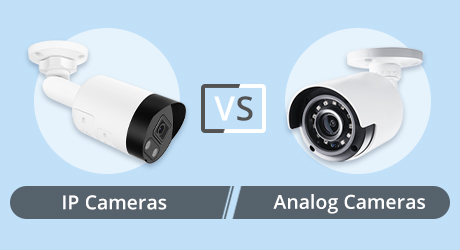Security is a top priority for both homeowners and business owners, and one of the most effective ways to ensure security is through the use of CCTV cameras. There are two main types of CCTV cameras available in the market today: IP CCTV cameras and analog CCTV cameras. Both types of cameras have their own advantages and disadvantages, and choosing between them can be a daunting task. In this blog post, we will compare IP CCTV cameras and analog CCTV cameras to help you decide which one is best for your needs.
What are IP CCTV Cameras?
IP (Internet Protocol) CCTV cameras are digital cameras that use the internet to transmit and receive data. These cameras are connected to a network, which allows remote access to the footage from any location. IP cameras use digital technology, which allows for higher resolution and clearer images compared to analog cameras. They are typically more expensive than analog cameras, but they offer higher image quality and more advanced features.
What are Analog CCTV Cameras?
Analog CCTV cameras use a closed circuit system to transmit data to a recording device. The footage is recorded on tapes or DVRs, and there is no remote access available. Analog cameras are less expensive than IP cameras, but they offer lower image quality and limited features.
Image Quality
One of the most significant differences between IP CCTV cameras and analog CCTV cameras is image quality. IP cameras offer higher image quality than analog cameras because they use digital technology, which allows for higher resolution and clearer images. This is especially important for identifying details like faces or license plates.
Remote Access
Another significant difference between IP CCTV cameras and analog CCTV cameras is remote access. IP cameras can be accessed remotely from any location, while analog cameras can only be accessed locally. This means that you can monitor your property from anywhere in the world with an IP camera. Analog cameras can only be accessed through the recording device.
Features
IP CCTV cameras offer more advanced features than analog cameras. These features include motion detection, facial recognition, and the ability to send alerts to your phone or email. IP cameras can also be integrated with other security systems, such as alarms and access control systems.
Cost
IP CCTV cameras are generally more expensive than analog cameras. However, the cost depends on the specific features and resolution you need. For example, a high-resolution analog camera can be more expensive than a low-resolution IP camera. It is essential to weigh the features and image quality against the cost when choosing between the two types of cameras.
Installation
IP CCTV cameras are easier to install than analog cameras. They do not require any special cabling or wiring, and they can be connected to your existing network. Analog cameras require a separate cable for power and video transmission, which can be more complicated to install.
Conclusion
Both IP CCTV cameras and analog CCTV cameras have their advantages and disadvantages. When choosing between the two, it is important to consider your specific security needs, budget, and installation requirements. If you are looking for higher image quality and more advanced features, an IP camera may be the best option for you. On the other hand, if you are on a tight budget and do not require advanced features, an analog camera may be a better choice. If you need help choosing the right CCTV camera for your home or business, call us for a free survey.

